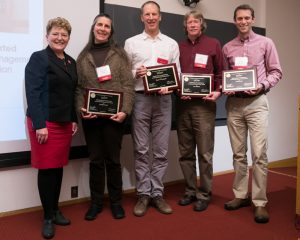Just one short week ago, we celebrated the College of Agriculture and Life Science at Cornell University’s Outstanding Accomplishments in Extension and Outreach Award. This award honors a team effort that benefits an important segment of the population or area of the state.

New York, like the rest of the world, is highly dependent on the hundreds of species of crop pollinators that collectively contribute roughly $170 billion a year to the global economy. Many are in decline and under threat in New York and elsewhere.
That’s why Dean Kathryn J. Boor ’80 recognized the Cornell Pollinator Health Team for their outstanding outreach accomplishments in a ceremony that celebrated research, extension and staff excellence.

The seven-member team includes entomologists, extension outreach specialists and pest management experts — one being NYS IPM‘s director Jennifer Grant.
The team provides critical extension and outreach on pollinator declines, including information on
- optimal habitats for honey bees, native bees, and other pollinators
- diseases that afflict bees
- how pesticides affect bees — other pollinators too
- what to do when your honey bees are in decline

With its focus on extension and outreach, the team has given more than 70 extension talks over the past three years in New York and elsewhere on pollinator health, bee diversity, integrated pest management practices and pesticide recommendations that minimize risks to bees — to all pollinators, in fact. Their audiences have included beekeepers, farmers, and lawmakers — as well as state and national organizations such as the New York Farm Bureau, the Audubon Society and Future Farmers of America.
“In three short years, the work of this team has made a notable impact both in scope and relevance to beekeepers,” Boor said at the ceremony. “The pollinator health team represents a model for how collaboration among different units at Cornell can lead to highly integrative and creative extension and outreach.”